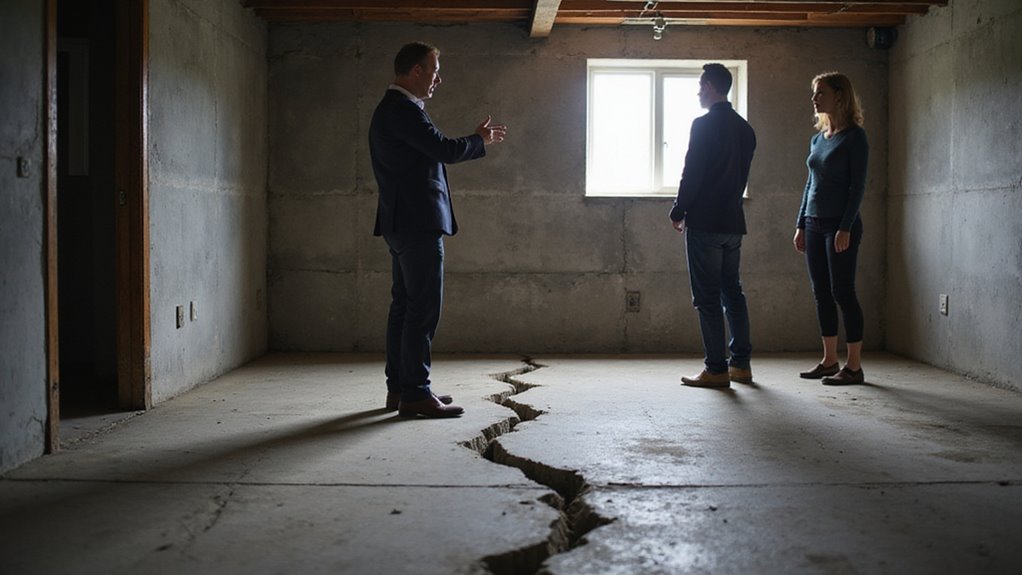Selling a house with foundation issues can be stressful and legally risky. Many homeowners worry about how to disclose problems and avoid trouble. You need to know what steps to take before listing your home.
If you skip legal steps or hide damage, you could face lawsuits or lose money. Disclosure laws are strict, and buyers often hire inspectors. One mistake can delay the sale or cause future legal headaches.
You must follow your state’s disclosure laws, document all defects, and negotiate transparently when selling a home with foundation issues.
This blog will guide you through the legal steps and help you avoid common mistakes. With these tips, you can protect yourself and sell your home with confidence.
Key Takeaways
- Sellers must legally disclose all known foundation issues and repair history to potential buyers.
- Failure to disclose foundation problems can lead to lawsuits, sale rescission, and financial penalties.
- Providing inspection reports and structural assessments strengthens transparency and limits legal risks.
- Adjusting the sale price or offering repair credits is common to address foundation concerns during negotiations.
- Consulting a real estate attorney ensures compliance with disclosure laws and contract requirements.
Understanding Foundation Issues and Their Impact on Home Sales

Foundation issues can hurt your chances of selling a home. These problems often lower your home’s value. Buyers may see them as serious risks.
If buyers notice foundation damage, they might ask for a lower price. Some buyers could also ask you to fix the issue before the sale. Repairs for foundations can be expensive and take time. In Virginia, working with cash buyers who purchase homes as-is is sometimes an option for sellers dealing with major foundation problems.
Any foundation problem usually affects how much your home is worth. Appraisers and agents will consider repair costs and risks. This can make your home less appealing to buyers.
As a seller, you need to know how these problems affect your sale. If you understand the impact, you can plan your next steps. Setting realistic expectations helps you make better choices during the process.
Like with pest damage, Virginia law may require you to make honest disclosure forms regarding known foundation issues to avoid legal risks and penalties.
State and Local Disclosure Laws
You’re legally obligated to complete required disclosure documents that detail your home’s foundation issues, and these forms vary by state and municipality. Failing to disclose known defects can expose you to serious penalties, including lawsuits or costly contract rescissions.
Understanding your specific disclosure obligations is essential to protect yourself from legal and financial consequences during the sale. It’s equally important to check for other property liens that might impact your ability to transfer a clear title to the buyer. Working with local real estate experts can help ensure you accurately comply with Virginia’s disclosure laws and avoid unnecessary legal risks.
Required Disclosure Documents
State and local laws require you to share documents about your home’s condition. You must tell buyers about any foundation problems you know of. If you fail to disclose these issues, you could face legal trouble.
You should gather and fill out certain documents before selling. These include a property disclosure statement, repair records, and insurance claim details. Some places may have extra forms for local requirements.
A property disclosure statement lists any defects, including foundation concerns. Repair documents show what work was done and by whom. Insurance records explain any past claims.
Accurate paperwork protects buyers and you from future issues. If you are unsure, ask a real estate agent or attorney for help. Careful disclosure is required by law and builds buyer trust.
Penalties for Non-Disclosure
Failing to disclose foundation issues can lead to serious problems for the seller. Buyers have the legal right to know about any structural defects before buying a home. If you hide this information, you could face legal action.
Courts may require you to pay for repairs or even buy the house back. Some states may add civil or criminal penalties if you do not follow disclosure laws. Your reputation and future sales could suffer as well.
If you disclose foundation problems early, you protect yourself from these risks. Always keep records of what you tell buyers. This can help if any disputes come up later.
Seller’s Duty to Disclose Known Defects

You must tell buyers about any foundation problems you know about. Laws require you to share this information before selling. This helps buyers make informed choices and protects you from legal troubles. If you have a structural assessment, you must give buyers a copy. You should also mention any foundation repairs and when they happened. Explain if there are visible cracks, uneven floors, or doors that stick.
List any repairs or warranties related to the foundation. Keep in mind that selling with foundation issues may limit the buyer pool, as some buyers are wary of major defects. Always write down what you disclose. This keeps a clear record and helps avoid disputes. Disclosing foundation issues as mandated by Virginia law ensures both transparency and compliance, while giving buyers confidence during the process.
What Constitutes a Material Defect
You need to understand exactly what qualifies as a material defect when selling your home. A material defect is any issue—such as significant foundation problems—that could substantially affect your property’s value or pose a safety risk. Laws require you to disclose these defects clearly, as failing to do so can lead to serious legal consequences.
When selling a house with foundation issues, it’s also important to consider how maximizing natural light and maintaining a neutral, inviting environment can help minimize buyer concerns and increase overall appeal, even when disclosure is required. Remember that disclosure requirements in Virginia are strict, especially regarding structural damage and safety risks, so providing full and honest information is critical.
Definition of Material Defect
A material defect is a problem with a property that affects its value or safety. Sellers must know that these issues are more serious than simple cosmetic flaws. If you know about a material defect, you must legally disclose it.
Material defects include things like major structural problems or health hazards. These are issues that could make a buyer change their mind about purchasing. Any defect that might lower the offer price is also considered material.
If a condition could harm someone or damage the property, it likely counts as a material defect. Sellers must be honest about these problems to avoid legal trouble. Always check if a defect meets these criteria before deciding to disclose it.
Impact on Property Value
Foundation problems can lower the value of your property. Appraisers often give lower valuations when they see structural concerns. Buyers may also lose interest if they notice these issues.
A foundation issue is a material defect if it changes what a buyer would pay for your home. Even if you fix cosmetic problems, unresolved foundation damage still lowers value. If a foundation problem causes a large loss in value, it becomes a serious defect.
Foundation repairs can be expensive and bring uncertainty about future stability. If you plan to sell, these issues can make your home harder to market. Potential buyers usually see foundation problems as warning signs.
Disclosure Requirements Explained
Most states require you to disclose foundation issues when selling a home. Foundation problems can lower a home’s value or make it unsafe. If you hide these issues, you might face legal trouble.
A material defect is anything that affects value or safety. You must report any foundation repairs you know about. Always be honest about current or past problems.
You should share records of foundation repairs with buyers. Known cracks, settling, or water leaks in the foundation must be mentioned. If you have inspection reports or repair recommendations, you should provide them too.
Required Inspection Reports and Documentation
To sell a house with foundation problems, you must provide certain reports and documents. These records help prove the property’s condition and protect you legally. Buyers need this information to make informed choices.
Selling a house with foundation issues requires specific reports and documents to disclose the property’s condition and protect all parties involved.
A structural engineer’s report is required. This report should explain the damage, repairs, and future recommendations. It must include photos, diagrams, and a clear summary. You should also make sure this report is part of your property inspection & repairs documentation, as this adds credibility to the sale.
If you fixed the foundation, gather all repair permits and receipts. Warranties from contractors should be included if available. These documents show the quality and details of the work done.
If there are ongoing checks or maintenance plans, include that paperwork. These details help buyers understand future needs. Good records can prevent misunderstandings or disputes during the sale.
It’s also important to ensure all inspection reports and documentation are organized and reviewed with professionals before closing to avoid any delays.
Potential Consequences of Non-Disclosure

Failing to disclose foundation issues can lead to serious legal and financial problems. Sellers are still responsible for hidden problems, even if the home looks good. Buyers trust the information provided and expect honesty.
If you hide these issues, you may face lawsuits for fraud or misrepresentation. The sale could be canceled, and you might have to return the money. Your reputation with buyers and agents could also suffer. According to Virginia law disclosure requirements, transparency about major issues like foundation problems is not just an ethical practice but a legal obligation.
Courts may require you to pay for repairs after the sale. Being honest protects you from these risks. Transparency ensures your efforts to improve the home do not become future problems.
Using recent sales data to accurately price your home not only helps attract buyers quickly but also supports honest disclosure practices, making the entire sale process smoother and reducing chances of dispute.
Liability After the Sale
You need to understand how disclosure requirements determine your liability once the sale is complete. If you fail to fully inform the buyer about foundation issues, you risk facing legal claims even after the transaction closes. Courts often hold sellers responsible for undisclosed defects, so your compliance with disclosure laws directly impacts your post-sale risk.
In Virginia, being transparent about known issues is essential, as clear and thorough disclosures can protect you from future disputes or legal actions after the sale. Working with trusted cash home buyers can further reduce your stress, as these buyers are experienced in purchasing properties “as is” and help ensure all necessary paperwork and disclosures are completed to protect both parties.
Disclosure Requirements Explained
When you sell a house with foundation problems, the law says you must tell buyers everything you know. You should never hide or lessen the seriousness of these issues. If you are open, you lower the risk of legal trouble later.
Sellers need to share any reports from structural experts. It is important to give buyers detailed records of all foundation repairs. If you have documents from contractors or engineers, you should include those too.
You must point out any cracks or signs of settling you have noticed. If there are any warranties on repairs, provide these to the buyer. Buyers will feel more confident if you give them all the facts.
Post-Sale Legal Risks
Post-sale legal risks can still happen even if you fully disclose foundation issues. Buyers may sue if they think you hid problems. Courts will check if you shared all known repair history.
You should keep records of inspections, repairs, and assessments. These documents can help you if a dispute arises after the sale. “As-is” sales do not always protect you if you hide defects on purpose.
Some states allow buyers to file claims years after closing. Meeting all disclosure rules lowers your risk, but does not erase it. Legal risks may remain even after a careful sale.
As-Is Sales: What You Need to Know

Selling a house as-is can make the process quicker. Buyers know they will handle any repairs. However, you still have important legal duties.
Sellers must always disclose any known foundation problems. Failure to share this information could cause legal trouble later. Written disclosures are necessary.
If you have inspection reports or repair estimates, provide them to buyers. This supports transparency in your sale. Buyers may request a lower price to cover repair costs.
Adjust your list price to reflect needed foundation repairs. This helps set clear expectations. If unsure about your obligations, consult a real estate attorney.
Taking these steps can help protect you from legal issues. Clear communication supports a smoother sale. Honest disclosures build trust with buyers. Sellers in Grottoes, VA also benefit from no repairs needed when working with buyers who purchase homes as-is for cash.
Negotiating Repairs With Buyers
When negotiating repairs, you must clearly disclose all known foundation problems to avoid legal disputes later. You can offer repair credits or agree to price adjustments as strategies to address buyer concerns and keep the deal on track. By handling these negotiations transparently, you protect yourself and help ensure a smoother transaction.
Disclosing Known Foundation Problems
You must tell buyers about any known foundation problems. This is required by law because these issues affect home value and safety. Honest disclosure helps avoid legal trouble and lets buyers make informed choices.
Sellers should give clear documents about the foundation problems. These could include inspection reports or repair estimates. Detailed paperwork helps buyers trust your information.
Buyers will want specific details about the foundation issues. They may ask for engineering reports, repair records, or warranties. If you have these documents, provide copies to the buyer.
Offering Repair Credits
Offering repair credits can help sell a house with foundation problems. A repair credit gives buyers money to fix the issue themselves after purchase. This can make your home more appealing to buyers.
Sellers should get repair estimates from trusted contractors. These estimates show buyers the real cost of repairs. If you share these numbers, buyers can better understand the credit amount.
Repair credits can prevent long arguments about who should fix the problem. Buyers can choose when and how to repair the foundation. This method often leads to faster and easier sales.
Navigating Price Adjustments
Price adjustments help buyers and sellers agree on a fair value when foundation problems exist. If buyers discover foundation issues, they may ask for a lower sale price. Sellers can address this by negotiating a price change.
Sellers should collect repair estimates from licensed contractors. These estimates help both sides understand the costs involved. If questions arise, sharing these quotes can clarify repair needs.
All agreed price changes and repairs should be put in writing. Accurate legal disclosures are important to avoid future problems. If sellers are honest and clear, buyers are more likely to trust the process.
Working With Real Estate Agents
A real estate agent helps you sell a house with foundation problems. The agent explains the selling process and guides you through each step. If you have foundation issues, an agent can make the sale smoother.
An experienced agent knows about foundation repairs and structural reports. They help you gather the right documents to show buyers. Proper documents can build trust and show you are honest.
If you need to set a sale price, the agent uses repair estimates and reports to set it fairly. The agent also helps answer buyer questions about the home’s condition. This can help you avoid legal problems and reduce your stress.
If you follow the agent’s advice, you are more likely to meet legal disclosure rules. The agent’s knowledge can protect you from mistakes. Selling with a skilled agent increases your chances of a good result.
Legal Language in the Sales Contract

A sales contract is a legal agreement, so use clear words about any foundation problems. This helps protect you from future legal trouble. Buyers need to know the true condition of the home.
Sellers must list any known foundation problems in the contract. If repairs were done or are needed, mention them clearly. The contract should say who will pay for further repairs.
The contract should also have clear disclaimers. These limit your legal responsibility for foundation issues. If you are unsure, you should ask a lawyer for help.
Buyer’s Right to Cancel or Renegotiate
Many states allow buyers to cancel or change a home purchase if foundation problems are found. If an inspection shows major issues, buyers can usually leave the deal without penalty. Buyers may also ask for a lower price or request that repairs are done before closing.
Purchase agreements often include these options as part of the contract. Sellers should respond quickly and honestly to buyer requests. Ignoring these rights can cause legal issues or end the sale.
Knowing these rules helps sellers avoid delays and extra costs. If you are selling a house with foundation issues, be ready to negotiate. Always act in good faith to keep the process smooth.
Insurance Considerations for Foundation Problems
Insurance plays a key role when dealing with foundation problems. It can impact your home’s value, sale process, and legal risks. Most homeowner insurance policies do not cover foundation issues caused by settling, poor construction, or soil movement.
You should carefully check your policy for any foundation damage exclusions. If you have filed claims for foundation damage, these could affect future coverage. Any denied claims or limited payouts should be shared with buyers.
Insurance limitations may also affect a buyer’s ability to get financing. If coverage is limited, it can influence price negotiations. Sellers should be ready to discuss these matters openly during the sale process.
Consulting With Real Estate Attorneys
Consulting with a real estate attorney helps you understand your legal duties when selling a house with foundation issues. The attorney explains what you must tell buyers about the problems. This makes sure you follow state disclosure laws.
An attorney can show you how foundation issues might affect the home’s value. They might also warn you that buyers could offer less money. If lenders have concerns, the attorney can help you prepare for them.
Legal help reduces the chance of future disputes. Proper guidance helps make all paperwork correct and clear. This protects you and helps the sale go smoothly.
Conclusion
If you plan to sell a house with foundation issues, clear communication is essential. Honest disclosures and proper documentation can help you avoid legal problems. If you seek professional advice, you will likely experience a smoother sale.
If you want to sell quickly, we buy houses for cash, even with foundation concerns. Cash sales can save you time and reduce stress. When you choose a direct buyer, you may also avoid extra repairs and showings.
If you are ready to make a move, we can help at Align Real Estate Solutions. Contact us today to discuss your options. We are here to guide you through every step of the process.
Author
-

Zach Koops is co-founder and Real Estate Success Manager at Align Real Estate Solutions, serving homeowners across Virginia since 2024. With a passion for real estate and a heart for people, Zach has built his career around helping sellers navigate tough situations—foreclosure, inheritance, relocation, repair-overload—with clarity and compassion. He’s known for being straightforward, steady under pressure, and deeply invested in relationships. Outside of work, he spends his time as a husband and father, enjoys the outdoors in Shenandoah Valley, loves singing on stage, and constantly seeks growth through reading and new experiences.









